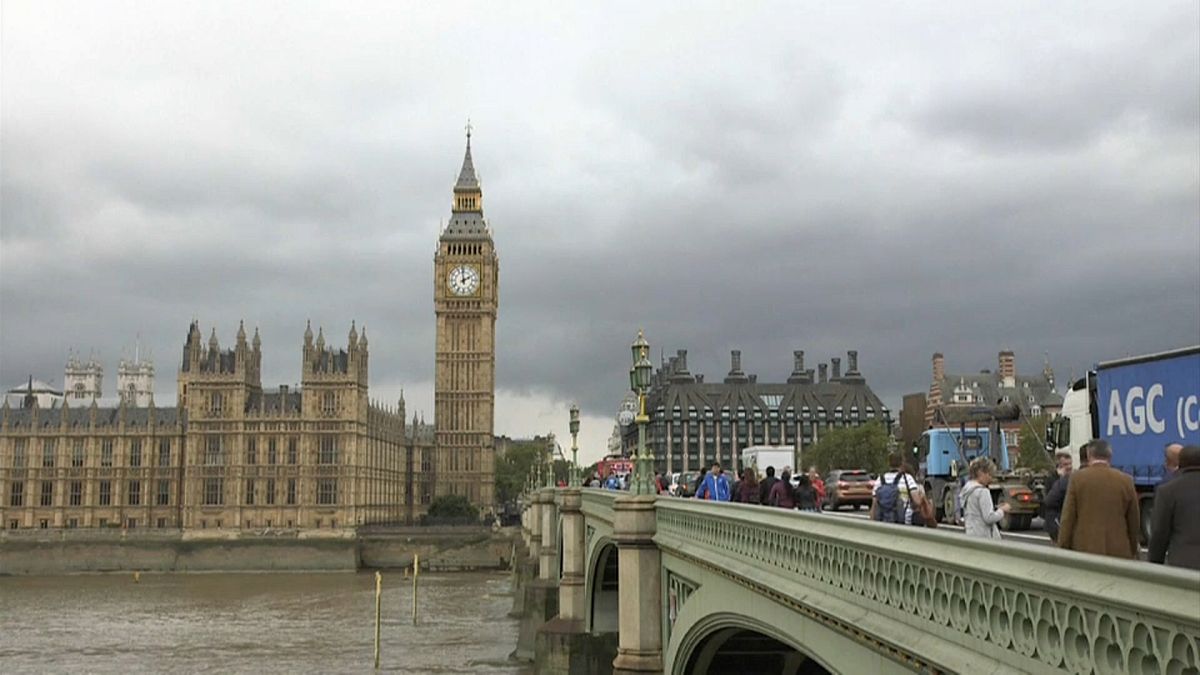Britain had hoped for a different scenario but it's now heading into a major showdown with Russia, a senior official at the Royal United Services Institute (RUSI) think tank tells Euronews.
As tensions mount between the UK and Russia over the poisoning of a former double agent on British soil, Russian President Vladimir Putin appears ready to "tear up completely the rulebook of international behaviour," a senior official at the Royal United Services Institute (RUSI) think tank has told Euronews.
Prime Minister Theresa May gave Russia until midnight on Tuesday to explain how former spy Serguei Skripal and his daughter Yulia were poisoned in the southern English city of Salisbury with a nerve agent developed by the Soviet Union.
Moscow has fiercely denied any connection to the poisoning and says the UK is whipping up anti-Russian hysteria. RUSI International Director Jonathan Eyal said in a Skype interview that May's move had not intended – at least initially – to be an ultimatum.
"As the British prime minister sees it, she was basically trying to give the Russians at least a possibility of getting out of a difficult situation. She hinted at the possibility that they may suggest that these are chemical compounds that have escaped from government control," Eyal said.
"But it is already clear that there is nobody in Moscow in any mood whatsoever at the moment to take that elegant way out and to prevent a much bigger showdown."
Eyal says the UK could cripple the Russian embassy in London by expelling a raft of diplomats, including the Russian ambassador. But any diplomatic retaliation would be more effective if the UK could show it has the support of its European allies.
"I think what will be watched very carefully in Moscow is if Britain is out on a limb on this one, or if the British government manages to carry its allies with it," Eyal said.
May, who said on Monday (March 12) it was "highly likely" that Russia was behind the Skripal poisoning, has already won support from the European Union, which denounced the attack as "shocking."
US President Donald Trump also agreed during a phone call with May that Moscow "must provide unambiguous answers regarding how this chemical weapon, developed in Russia, came to be used in the United Kingdom," the White House said in a statement.
New sanctions?
Britain could unilaterally slap new financial sanctions on Russia. Asking its EU allies to follow suit could, however, prove tricky. It would certainly irk Moscow.
"We have a new coalition government in Berlin; we have some arguments in Paris that the sanctions may be lifted; we may have a new Italian government that may also have wanted perhaps to lift the sanctions," Eyal said.
"So I think the Russians would find that their altercation with Britain came at a very inconvenient time for them – that if there were any movements to begin to relax the economic sanctions on Russia, all this has now gone out of the window."
"Although," he added: "As things currently stand, it appears that President Putin in Moscow believes that there is no hope for any good relations with the West, and therefore it’s his turn to tear up completely the rulebook of international behaviour."
Skripal, a former officer with Russian military intelligence, betrayed dozens of Russian agents to British intelligence before being arrested in Moscow and jailed in 2006. He was released under a spy swap deal in 2010 and took refuge in Britain, where he had been living quietly in the southern English cathedral city of Salisbury until he and his daughter were found unconscious on a public bench there on March 4.
May said Britain had identified the substance that critically sickened the pair as belonging to the lethal Novichok group of nerve agents developed by the Soviet military in the 1970s and 1980s.
If Russia was behind the attack, Eyal said that would break with a host of Cold-War era rules: “that you do not touch agents that have been exchanged as part of a spy swap, and you do not willingly engage in organised state murders on another country's territory.”
Russia holds a presidential election on March 18 in which Putin, himself a former KGB spy, is expected to easily win a fourth term in the Kremlin.
Moscow has denied any role in the poisoning and has accused Britain of fanning anti-Russian sentiment to spoil its hosting of the World Cup in June.
Eyal said he did not believe calls for a boycott of the event.
"Let’s not forget a lot of the British Olympians ignored the call for boycott in the early 1980s when the British government decided to join the Americans in boycotting the Olympic Games held in Moscow," he said, adding: "I’m not sure Mr Putin is terribly worried about it."
